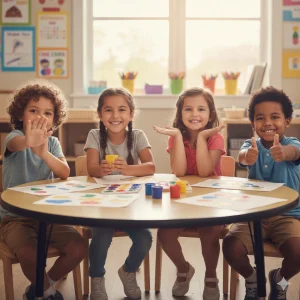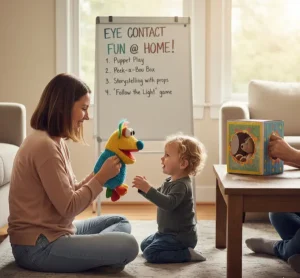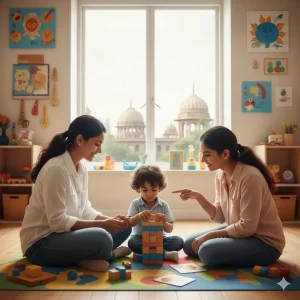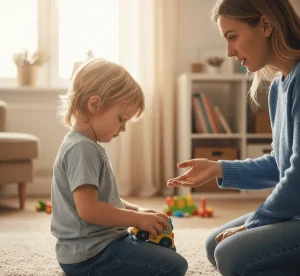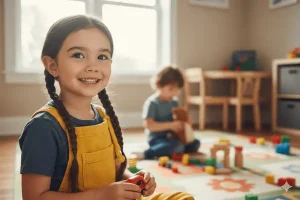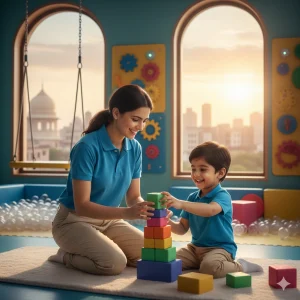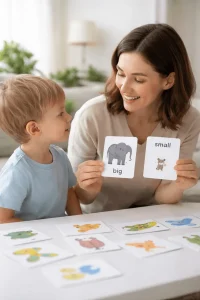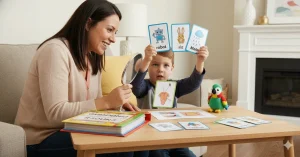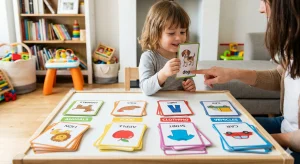Speech Delay in Toddlers: Signs Every Parent Should Watch For
By Wellness Hub
Last Updated: June 4, 2025
Is your toddler still not talking? You’re not alone.
It’s natural to wonder if your child’s speech is developing the way it should. Maybe your little one isn’t saying “mama” or “dada,” or they don’t respond when you call their name. And while some people might say, “It’s too early to worry,” deep down, something feels off.
That instinct matters.
Noticing a speech delay in toddlers early on can make a big difference. While every child develops at their own pace, there are certain signs and milestones that help parents know when to take a closer look.
Free Speech Help for Kids
Concerned about speech delays? Book a free consultation with our expert speech therapist and get guidance tailored to your child’s needs.
What is a Speech Delay in Toddlers?
A speech delay means your toddler isn’t developing spoken words at the expected age. For example, if your child isn’t babbling by 12 months or isn’t saying simple words like “mama” or “ball” by 18 months, it could be a sign of a toddler speech delay.
It’s important to understand the difference between a speech delay and a language delay in toddlers.
- Speech delay is when a child has trouble forming sounds and words.
- Language delay is when they struggle to understand or use words to communicate — even if they can make sounds.
Some children experience both, and that’s okay. What matters most is recognizing the signs early so you can support your child with the right help.
Know more: Toddler Speech Delay: Why Mama or Dada Isn’t Said Yet
Toddler Speech Milestones by Age
It’s easy to wonder, “Is my child’s speech on track?” Knowing what to expect at different ages can give you clarity — and peace of mind. Below are some common speech milestones that most toddlers reach as they grow.
Every child is unique, but these age-based markers can help you understand how your toddler’s communication skills are developing.
By 12 Months
At this stage, most babies:
- Babble with different sounds like “ba” or “da”
- Try to copy sounds you make
- Respond to their name
- Use simple gestures like pointing or waving
Even if they’re not using words yet, they’re learning the rhythm of conversation.
By 18 Months
You’ll likely notice:
- At least 6 to 10 spoken words (like “mama,” “ball,” or “no”)
- Understanding of simple phrases like “Come here”
- Pointing to objects they want or notice
- Repeating sounds or words they hear often
If your child isn’t using any words by now, it’s a good time to check in with a professional.
Read more: Understanding Toddler Speech: Speech Milestones at 18 Months
By 24 Months
Many toddlers will:
- Use around 50 words or more
- Start putting two words together (“more milk,” “go park”)
- Understand easy two-step directions
- Be easier to understand — even if not every word is clear
When to Be Concerned About a Toddler Not Talking
It’s true that children develop at their own pace — but sometimes, delays in talking may be a sign that your child needs extra support. So how do you know the difference between a late bloomer and something more?
Here’s a simple guide to help you spot the difference between normal speech variation and when to worry about a speech delay.
What’s Typically Normal
- Not saying clear words at 12 months, but babbling regularly
- Using gestures like pointing or waving to communicate
- Slowly picking up new words between 15–18 months
- Struggling to pronounce words clearly — that’s common early on!
When You Might Need to Take a Closer Look
- No babbling by 12 months
- Not using any words by 16–18 months
- Only a few words by age 2
- Doesn’t respond to their name
- Doesn’t try to copy sounds or gestures
- Uses only gestures, without attempting speech
- Speech seems to be regressing or disappearing
What Causes Speech Delay in Toddlers?
If you’ve ever asked yourself, “Why is my toddler not talking yet?” — you’re not alone. Many parents wonder the same thing. And while it can feel overwhelming, understanding the possible causes of speech delay can help you take the next step with clarity and confidence.
Here are some common reasons toddlers might experience a delay in speaking:
1. Hearing Issues
If your child can’t hear sounds clearly, they might struggle to pick up words and speech patterns. Even mild or temporary hearing loss (like frequent ear infections) can impact how they learn to talk.
2. Developmental Conditions (like Autism)
Some toddlers with autism spectrum disorder may have delays in both speech and social communication. They might not respond to their name, use gestures, or show interest in back-and-forth interaction. This doesn’t always mean autism, but it’s something to look into with care.
3. Lack of Exposure or Interaction
Children learn language through daily interaction — talking, playing, reading. A lack of consistent back-and-forth communication can slow speech development. The good news? This is one of the easiest areas to improve at home.
4. Other Medical or Neurological Causes
Conditions like oral-motor issues, intellectual disabilities, or certain genetic syndromes may affect how a child processes language or controls the muscles used for speech.
How to Help a Toddler with Speech Delay at Home
If you’re worried your toddler isn’t talking much yet, you’re probably wondering what you can do right now — at home — to make a difference. The good news? Small, simple steps can go a long way.
Here are a few at-home speech tips that many parents find helpful:
1. Talk More — All Day Long
Speak to your child often, even if they don’t respond with words yet. Describe what you’re doing (“I’m washing your cup”), label objects (“This is your spoon”), and name feelings (“You look happy!”). The more they hear, the more they learn.
2. Read Together Every Day
Picture books are powerful tools for building vocabulary. Choose books with clear images and repeat simple words often. Point to pictures and name them out loud: “Dog… woof!” Your child may start trying to copy you.
3. Use Gestures and Facial Expressions
Pointing, waving, clapping — all of these are early communication skills. Use gestures naturally while talking, and encourage your child to do the same. This builds confidence and lays the foundation for spoken words.
4. Encourage Imitation Through Play
Play face-to-face games like peekaboo or pretend play with toys. Model simple sounds (“vroom,” “moo”), and give your toddler time to copy you. Repetition helps — a lot!
5. Sing Simple Songs and Rhymes
Songs like “Twinkle Twinkle” or “Wheels on the Bus” teach rhythm, repetition, and language in a fun way. Try pausing mid-verse to see if your toddler fills in the blank: “The wheels on the bus go…”
Also read: 9 Effective Exercises to Overcome Speech Delay in Toddlers
When to Get a Speech Evaluation
If you’ve been wondering, “Should I wait or should I get help?” — you’re not alone. Many parents feel stuck between “Maybe they’ll catch up” and “What if I’m missing something?”
A speech evaluation is a gentle, expert-led assessment that looks at how your toddler understands, uses, and responds to language. It doesn’t involve tests or pressure — just a friendly look at where your child stands in their speech development.
So, when should you consider one?
You might want to schedule a speech evaluation if your child:
- Isn’t using words by 16–18 months
- Has fewer than 50 words by age 2
- Struggles to understand simple directions
- Rarely responds to their name or eye contact
- Lost words or skills they previously had
- Gets frustrated trying to communicate
Conclusion
If your toddler isn’t talking much or seems behind in speech, don’t ignore those early signs of delay. You’re not overthinking it — early support really does help. The sooner you act, the better the progress. Simple steps and the right guidance can make a big difference in your child’s speech.
At Wellness Hub, we specialize in supporting parents through every stage of their child’s speech development. From online evaluations to personalized therapy plans, our expert-led programs are designed to help your toddler thrive — right from the comfort of home.
You don’t have to wait or worry alone. Wellness Hub is here for you — with expert advice, practical tools, and real results you can trust.
Frequently Asked Questions:
1. What are the early signs of speech delay in toddlers?
Early signs of speech delay include little to no babbling by 12 months, not using single words like “mama” or “ball” by 18 months, and not pointing, waving, or making eye contact. If your toddler doesn’t seem interested in making sounds or isn’t trying to copy what you say, these can also be red flags. Spotting these early signs of delay can help you take action sooner.
2. How many words should my toddler say at 18 months?
By 18 months, most toddlers use about 6 to 10 clear, meaningful words. These might include names like “mama,” objects like “car,” or basic needs like “milk.” Some kids may use more, but if your toddler is using fewer than 5 words or none at all, it could be a sign of a speech or language delay.
3. Is it normal for a 2-year-old not to talk yet?
While every child develops at their own pace, by age 2, most toddlers use around 50 words and start combining two-word phrases like “more juice” or “go park.” If your child isn’t saying any words or only makes sounds without trying to talk, it may be time to explore a speech evaluation for peace of mind.
4. When should I worry if my toddler is not talking?
You should be concerned if your toddler isn’t using any words by 16–18 months, doesn’t respond to their name, avoids eye contact, or shows frustration when trying to communicate. These signs don’t always mean something serious, but they do suggest it’s a good time to seek help. Early support makes a big difference.
5. What causes speech delay in toddlers?
There are several possible causes of speech delay. These include hearing loss (often from frequent ear infections), developmental conditions like autism, a lack of daily language exposure, or oral-motor issues that affect how they form words. Sometimes, no exact cause is found — but that doesn’t mean support isn’t needed.
6. Can I help my toddler talk at home?
Yes! You can do a lot at home to support speech development. Talk to your child throughout the day, describe what you’re doing, read simple books, sing songs, and use gestures. Repeat words often and encourage your toddler to imitate sounds. These daily interactions are powerful tools to help your toddler talk more naturally.
7. What is a speech evaluation for toddlers?
A speech evaluation is a gentle, play-based assessment done by a speech therapist. It looks at how your child listens, understands, and uses words. The therapist may ask your child to point to pictures, follow simple directions, or name familiar objects. It’s designed to be fun and comfortable for young children, with no pressure at all.
8. Will my toddler grow out of speech delay on their own?
Some children who are “late talkers” do catch up on their own — but others need help. Without support, the delay could continue or affect learning and social skills later on. The safest approach is to not wait. Getting early help gives your child the best chance to improve quickly and confidently.
9. What is the difference between speech delay and language delay?
A speech delay means your child has trouble saying sounds or words clearly. A language delay means they may not understand or use words to communicate, even if they can make sounds. It’s possible for a child to have both. Understanding the difference helps you choose the right support.
10. Where can I get support if I think my child has a speech delay?
You can get expert help through Wellness Hub’s speech therapy programs. We offer online speech evaluations, therapy sessions, and step-by-step guidance for parents. Whether you’re just starting to worry or looking for structured support, Wellness Hub is here to help your child communicate better from the comfort of home.
About the Author:
Shilpa Deshpande
Shilpa Deshpande is a skilled speech-language pathologist with over 14 years of experience. Fluent in Kannada, Telugu, Hindi, and English, she specializes in parent counseling, speech sound disorders, fluency assessment, and speech-language evaluations. Shilpa excels at working with children with developmental disorders, offering creative and effective therapy programs. Currently, at Wellness Hub, she holds a BASLP degree and is registered with the RCI. Her patience, ambition, and dedication make her a trusted expert in her field.
Book your Free Consultation Today
Parent/Caregiver Info:
Client’s Details:
* Error Message
